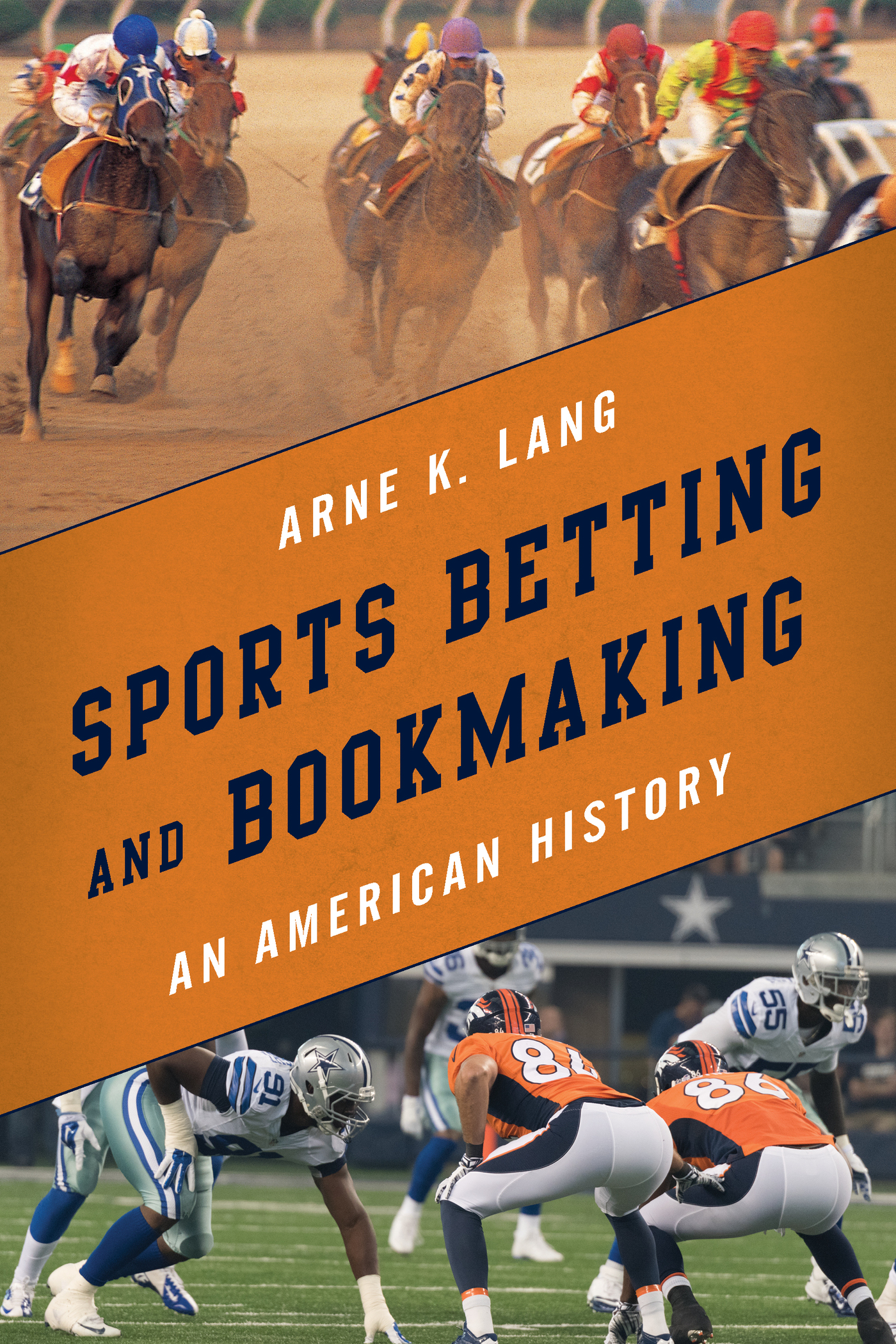Sports Betting and
Bookmaking
Sports Betting and
Bookmaking
An American History
Arne K. Lang
ROWMAN & LITTLEFIELD
Lanham Boulder New York London
Published by Rowman & Littlefield
A wholly owned subsidiary of The Rowman & Littlefield Publishing Group, Inc.
4501 Forbes Boulevard, Suite 200, Lanham, Maryland 20706
www.rowman.com
Unit A, Whitacre Mews, 26-34 Stannary Street, London SE11 4AB
Copyright 2016 by Rowman & Littlefield
All rights reserved. No part of this book may be reproduced in any form or by any electronic or mechanical means, including information storage and retrieval systems, without written permission from the publisher, except by a reviewer who may quote passages in a review.
British Library Cataloguing in Publication Information Available
Library of Congress Cataloging-in-Publication Data
Names: Lang, Arne K., author.
Title: Sports betting and bookmaking : an American history / Arne K. Lang.
Description: Lanham, Maryland : Rowman & Littlefield, 2016. | Includes bibliographical references and index.
Identifiers: LCCN 2015047132 (print) | LCCN 2016008782 (ebook) | ISBN 9781442265530 (hardback : alk. paper) | ISBN 9781442265547 (electronic)
Subjects: LCSH: Horse racingBettingUnited StatesHistory. | Sports bettingUnited StatesHistory. | Book-making (Betting)United StatesHistory.
Classification: LCC SF332 .L36 2016 (print) | LCC SF332 (ebook) | DDC 798.4010973dc23
LC record available at http://lccn.loc.gov/2015047132
 TM The paper used in this publication meets the minimum requirements of American National Standard for Information Sciences Permanence of Paper for Printed Library Materials, ANSI/NISO Z39.48-1992.
TM The paper used in this publication meets the minimum requirements of American National Standard for Information Sciences Permanence of Paper for Printed Library Materials, ANSI/NISO Z39.48-1992.
Printed in the United States of America
Acknowledgments
I couldnt have written this book if I hadnt spent the bulk of my adult years in Las Vegas where I got to know many interesting people involved in sports wagering. A number of these people helped shape this book, if only by sharing their insights. I have known Dana Parham for more than twenty-five years. Through him I got to meet the fabled Bill Benter, who was generous in sharing his remarkable story. Kirk Brooks, Rob Terry, Dion Frayle, Brian Kist, and Arturo OConnor provided keys that opened more doors.
In my younger days after leaving the academic world, I had a sideline as a personality in the emerging wave of sports talk radio. I feel a special debt to Russ Culver, the noted oddsmaker, who got the ball rolling, and to David Malinsky, the longest-tenured of my various cohosts. They taught me plenty, as did Michael Roxborough, another friend of long standing, who bubbled forth during the dawn of those inspiriting days.
I have been privileged to know Lem Banker, a man of good cheer with a wealth of good stories. Howard Schwartz, the marketing director of Gamblers Book Club, has been a longtime supporter. Eileen DiRocco provided me open access to the back files of Gaming Today. Christen Karniski of Rowman & Littlefield believed in this book and was a good shepherd, navigating the manuscript through the protocols of her publishing house. Thanks to Alan Shaw, Mike Kerzetski, Doug Dunlap, Helen Salinas, and Art Rubin for being good neighbors. Im grateful to Shane Langvad and Jessica Welman for their technical support. And heres a toast to the many absent friends who encouraged me to keep writing. In memoriam, thank you Mike Lee, Huey Mahl, Harvey Rothman, Lee Pete, Bobby Bryde, and John and Edna Luckman.
The Department of Special Collections at the UNLV Lied Library is a terrific resource, and the people working there are always pleasant and helpful. The department houses the invaluable Center for Gaming Research.
How does one begin to thank all the people who enlightened me as I was surfing the web? Its impossible. However, with due respect to all the unnamed, Id like to say that I enjoy reading the threads on Colins Ghost, the horse racing history site that Kevin Martin founded. Mr. Martin understands that all those long-gone racetracks were something more than homes for gambling. For many they were homes in the hearth sense; communal gathering places that gave rise to lasting memories.
My life has been enriched by a very special lady, my wife, Kitt. This book is for her.
Introduction
In 1922 a young reporter named Herbert Asbury, later a noted author, made an interesting observation about bookmaking. It is the biggest business in the United States, he said, that is operated on credit without collateral.
Bookmakers in those days dealt primarily with horseplayers. They operated behind a veil of secrecy, as they had been forced into the shadows, expelled from the racetrack betting enclosures where their profession had taken flight. In the pages of this book we lift that veil to examine the nuts and bolts, and explore the historical roots, of a largely obscure field of commerce.
A historical analysis of bookmaking necessarily pots it against the backdrop of thoroughbred racing, an enterprise that rose from the ashes to become Americas leading spectator sport, only to dwindle to where loyal racetrack patrons came to be seen as remnants of a lost tribe. As the racing game was fraying, team sportsfootball and basketball and suchbecame a bigger and bigger betting attraction, eventually swamping horse racing as the bread-and-butter of the bookmaking community. These were not unrelated developments. The shift was spurred in some small measure by disaffected horseplayers.
When I started this book I didnt know where it would take me, but I knew where I didnt want to go. I didnt want to write a book about the racing game that focused on rogues and scandals and I didnt want to explore the history of bookmaking through the prism of organized crime.
Rogues and scandals were common themes in early writings about horse racing, when the prevailing viewpoint was that racetracks, by virtue of being hives of gambling, fostered behavior that aggravated a host of social problems. Writers of later years who wrote about illegal, off-track betting were, by and large, dismayed by the specter of it and contemptuous of the men that steered the ship. It became an article of faith that bookmakers were agents of organized crime; not merely struts in a polymorphous criminal enterprise, but the pillars without which the enterprise would crumble. The lurid title of a 1961 book, A Two-Dollar Bet Means Murder, exemplifies this mind-set.
These persistent themes have produced a body of literature that barely recognizes that playing the ponies is an enterprise well fitted to many fields of inquiryprobability theory, entrepreneurial studies, and the sociology of leisure to name but a few. And it wasnt as if bookmakers and their emissaries were hard to find. At various times and places they burst out of the shadows in great profusion. In 1949, there were reportedly 443 places in New Orleans where a fellow could consign a bet on a horse race. Evansville, Indiana, which then had a population of about a hundred twenty-five thousand, had forty bookie joints. Steubenville, Ohio, which had a peak population of about forty thousand, once housed eleven full-fledged bookmaking establishments.
These figures, culled from Life magazine, Sports Illustrated, and the biography of Steubenville native Jimmy the Greek, lack supporting documentation, but, inflated or not, they paint a picture of a robust industry. In some communities, horse parlors, in the aggregate, were as well patronized as movie theatres, notwithstanding the fact that the parlors appealed to a narrow demographic: adult men with a smattering of adult women.
Next page
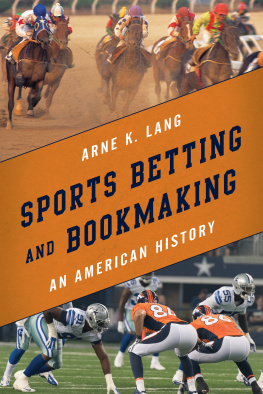
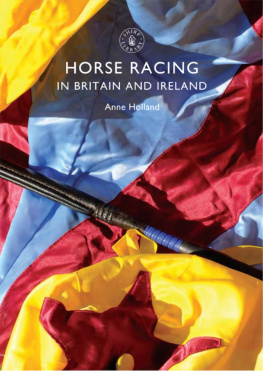
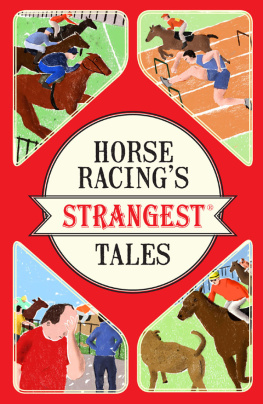
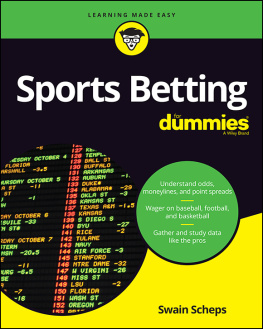
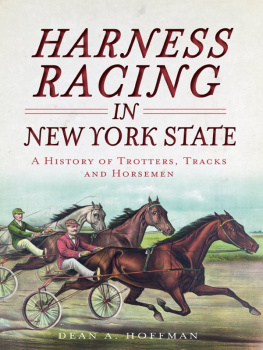


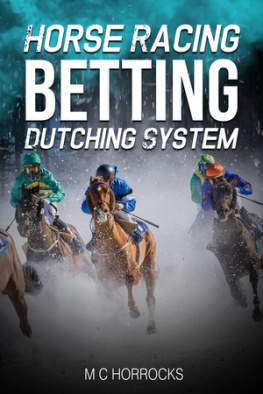
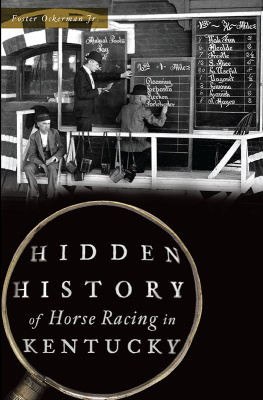
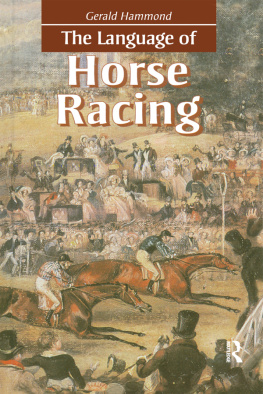
 TM The paper used in this publication meets the minimum requirements of American National Standard for Information Sciences Permanence of Paper for Printed Library Materials, ANSI/NISO Z39.48-1992.
TM The paper used in this publication meets the minimum requirements of American National Standard for Information Sciences Permanence of Paper for Printed Library Materials, ANSI/NISO Z39.48-1992.